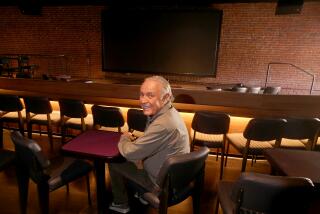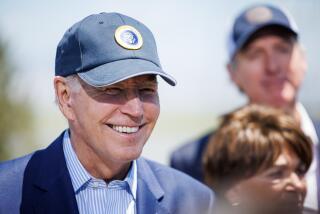Bush Officially in Race, Vows No New Taxes
HOUSTON — Vice President George Bush officially declared his candidacy for the Republican presidential nomination here Monday, calling for a revival of American idealism, vowing not to raise taxes, and promising to push for “a taxpayer’s bill of rights.”
Addressing about 2,000 applauding supporters in the city where he launched his political career two decades ago, flanked by his wife, children and grandchildren, Bush touched only briefly on specific problems confronting the nation. For the most part he sought in the sober, 30-minute speech to establish a lofty tone for his candidacy, an objective that appeared to re flect his status as the front-runner in the struggle to become the GOP nominee.
The speech, which Bush read almost word for word from a text prepared for a TelePrompTer, also reflected the 63-year-old Bush’s reputation as a pragmatist and centrist since nearly every specific point he made was balanced by a counterpoint.
“We must continue--and accelerate--our efforts to cut the federal budget deficit,” he said. But he also told his audience that he would not try to break the impasse over the budget deficit “by breaking you. I am not going to raise your taxes--period.”
Similarly Bush declared that he did not hate government and was proud of his own long career in public service.
But he complained that “for too long the rules of the game,” including the authority of the Internal Revenue Service, “have been cloaked in deliberate ambiguity.”
He asserted that the time had come for “a bill of rights that spells out explicitly what the limits of IRS power are,” and he promised to “put the force of my presidency” behind this proposal.
Looking abroad, the vice president hailed the anticipated agreement with the Soviet Union limiting intermediate-range nuclear missiles as historic, and called for further talks on “strategic arms, conventional weapons, chemical weapons, biological--all those things.”
‘Keep Your Guard Up’
But he cautioned that in dealing with the Soviets the proper U.S. attitude should be: “Praise God--and keep your guard up.”
For the most part though, Bush seemed determined to use the speech to demonstrate his fitness to take advantage of what he described as “the incomparable opportunity” offered by the presidency to exercise moral leadership. Much of his rhetoric on this point seemed aimed more at the general electorate that will decide the election in November, 1988, than at the Republican voters who will choose among Bush and his five rivals for the party’s nomination.
“We don’t need radical new directions,” as a nation, he said. “We don’t need to remake society--we just need to remember who we are.”
While lauding the economic achievements of the Reagan Administration, Bush said that what the nation needed was not just prosperity, but “prosperity with a purpose.” He defined this as “helping your brothers and sisters, whoever they are, wherever they are, whatever their needs.”
“Where is it written that Republicans must act as if they do not care, as if they are not moved?” he asked. “We are the party of Lincoln. Our whole history was protecting those who needed our protection and making this a kinder nation.”
Bush decried “those who have dropped their standards along the way . . . as if ethics were too heavy and slowed their rise to the top.” He charged that there is “greed on Wall Street and graft in City Hall and influence peddling in Washington--and it’s all so shameful.”
Calling for a return to the early spirit of America, Bush said: “We weren’t saints, but we lived by standards.” He warned: “We make ourselves small by pursuing small things. And I find myself saying to my children: ‘You’ve got to live by values if you want to live a life of meaning.’ ”
Earlier in the day, chatting with reporters aboard Air Force Two en route here from Washington, Bush dismissed the notion advanced by some of his aides that as of now he has a new job, as candidate for President, which would put his vice presidential duties in second place. “I’ll be both,” he said, though he conceded he will have to occasionally “shift gears from the present to the future.”
Bush is the fourth Republican to declare for the presidency, the others being New York Rep. Jack Kemp, former Secretary of State Alexander M. Haig Jr., former television evangelist Pat Robertson and former Delaware Gov. Pierre S. (Pete) du Pont IV. Kansas Sen. Bob Dole, regarded as Bush’s chief rival for the nomination, is planning to make his announcement next month.
Bush’s strategists are counting on the favorable attention they anticipate the vice president will receive during his weeklong announcement trip to help offset the negative impact of a series of recent events. First Bush was embarrassed by Robertson, whose supporters outpointed Bush’s backers in a much-heralded straw poll in the strategically vital Iowa battleground.
Next Robertson embarrassed Bush again by combining forces with Kemp to win a procedural victory over Bush in Michigan, threatening Bush with defeat when that state’s Republicans pick their delegation to the national convention next January.
Then Bush embarrassed himself during a trip to Europe when, in praising the skill of Soviet mechanics, he suggested they should be sent to Detroit, a notion that stirred a predictable storm of protest and forced him to apologize.
Bush’s strategists claim such misadventures are an inevitable consequence of his leadership position in the GOP race, and the extra critical attention that comes with that role. But his foes contend these negative happenings are evidence of fundamental weaknesses in Bush’s candidacy--a lack of enthusiasm at the grass roots, along with an ingrained clumsiness in Bush’s personal style.
Monday’s Houston announcement marked Bush’s official resumption of the quest for the White House he initially launched eight years ago when he sought the 1980 Republican nomination, challenging Ronald Reagan, who was the early front-runner in that contest.
In contrast with his present celebrity and front-runner status, Bush was then little known outside the ranks of party regulars whom he had cultivated as Republican national chairman and was lightly regarded by most political analysts.
But thanks in large part to his unrelenting energy and ambition, Bush scored a stunning upset victory in the first delegate contest in Iowa that vaulted him to the forefront of the Republican race. And Bush’s strong showing made it logical for Reagan, after he had prevailed in the contest for the presidency, to pick Bush as his running mate.
But Bush’s 1980 presidential candidacy had its downside, too. By opposing Reagan, then as now the idol of most GOP conservatives, Bush incurred the resentment of many of Reagan’s hard-core right-wing supporters. In some quarters that antagonism persists and represents a major obstacle Bush must overcome if his drive for the 1988 nomination is to succeed.
GEORGE HERBERT WALKER BUSH
Born: June 12, 1924, Milton, Mass.
Parents: The late U.S. Sen. Prescott Bush and Dorothy Walker Bush.
Education: Yale University, B.A., 1948.
Military Career: U.S. Naval Reserve, 1942-43; U.S. Navy, 1943-45.
Professional career: Oil business in Midland and Houston, Tex., in 1950s; helped found Zapata Petroleum Corp., 1953; became active in Republican politics in early 1960s; lost U.S. Senate race in 1964 to Democrat Ralph Yarborough; member, U.S. House, 1967-71; lost Senate race in 1970 to Democrat Lloyd Bentsen; U.S. ambassador to United Nations, 1971-73; chairman, Republican National Committee, 1973-74; head of U.S. liaison office in China, 1974-75; Director of Central Intelligence, 1975-77; unsuccessful candidate for 1980 GOP presidential nomination, but chosen by Ronald Reagan as running mate; vice president, 1981-present.
Family: Wife, Barbara Pierce; four sons, one daughter.
Religion: Episcopalian.
Accomplishments: Flew 58 combat missions in Pacific during World War II and received Distinguished Flying Cross; in House, successfully sponsored an ethics bill for members of Congress; worked tirelessly to hold Republican Party together during Watergate; as intelligence chief, was widely credited with raising morale at CIA; as vice president, has worked hard to portray himself as a loyal soldier for Reagan; major vice presidential assignments have included chairmanships of task force on regulatory reform and an interagency task force to fight imports of illicit drugs.
Positions: Has tended to avoid going into detail on issues, indicating he will do so after formally declaring his candidacy; favors adhering to Gramm-Rudman targets as way to reduce budget deficit; favors line-item veto; favors continued aid to contras as a means of working toward a negotiated settlement in Nicaragua; opposes abortion except when mother’s health is endangered; favors voluntary school prayer; favors research and testing on “Star Wars” program, reserving decision on deployment.
Strengths: Widespread allegiance of party officials and workers; huge advantage in campaign finances over rivals; depth of experience in elective and appointed posts; experienced presidential campaigner; strong identification both Northeast and in Texas; close relationship with Reagan.
Vulnerabilities: No strong hold on conservative core of the party and doubts about depth of support elsewhere; no early demonstration of a strong political identity separate from Reagan; shifts in positions raise doubts about convictions.
More to Read
Get the L.A. Times Politics newsletter
Deeply reported insights into legislation, politics and policy from Sacramento, Washington and beyond. In your inbox three times per week.
You may occasionally receive promotional content from the Los Angeles Times.










